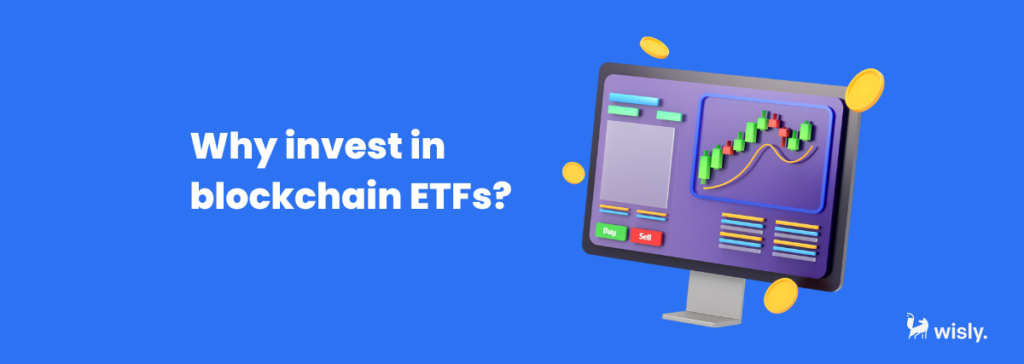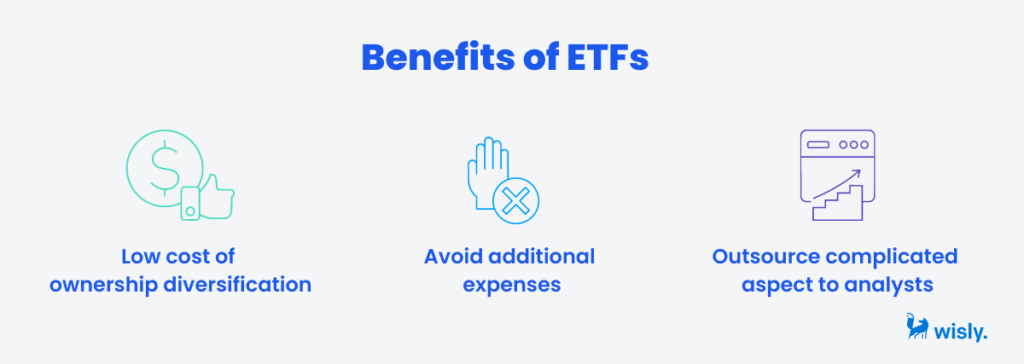Blockchain ETFs are thematic exchange-traded funds (ETFs) – consisting of cryptocurrencies – that own the stocks of companies that use or develop blockchain technology. ETFs typically monitor an index or basket of assets, although crypto ETFs track the price of one or more digital tokens.
Share prices of crypto ETFs fluctuate daily – based on investors’ sales and purchases, and like common stocks, are traded daily too. Blockchain ETFs tend to invest in a much wider range of assets when compared to things like Bitcoin ETFs that focus on tracking the price of a single cryptocurrency.
ETF investment is spread across many different industries that can be broken down into a few categories:
Companies that own cryptocurrency: Companies such as MicroStrategy and Tesla have big amounts of Bitcoin and other digital assets on their balance sheets.
Crypto exchanges and crypto miners: Coinbase, for example, is a leading cryptocurrency exchange, while Marathon Digital is a Bitcoin mining company.
Financial services firms: Take Galaxy Digital Holdings, the company that manages crypto assets that attain their value from the blockchain. In addition, global banks HSBC and BNP Paribas finance blockchain initiatives and are creating their own blockchain applications.
Tech companies: Microchip makers such as NVIDIA Corp and Advanced Micro Devices supply hardware that is widely used to support blockchain systems. Moreover, software companies like VMW, which lead cloud computing technology, also have blockchain-focused businesses.
Variations of blockchain ETFs

There are two types of blockchain ETFs.
The first type is backed by physical cryptocurrencies, and the investment companies managing the fund buy crypto. Ownership of these cryptocurrencies is represented as shares. Essentially, buying ETF shares will indirectly make investors the owners of cryptocurrencies, exposing them to digital assets without any expense or risk.
The second type of ETF is a synthetic variant that monitors crypto derivatives such as futures contracts and crypto exchange-traded products (ETPs). ETF share prices mimic the price movements of derivatives instead of the actual prices of cryptocurrencies. Essentially, the price of shares of a specific crypto ETF will rise with an increase in futures contract prices.
Why invest in blockchain ETFs?

Blockchain technology is still in its infancy when it comes to development, with many industries and established companies using blockchain technology to improve their operational models. With that being said, investing in a diversified blockchain ETF is a fantastic way to gain exposure to the world of crypto without actually bearing much of the risk.
Investors typically spread the crypto ETF investment to safeguard themselves from undue risk further. When considering how quickly the blockchain space is developing, it makes perfect sense to invest in blockchain ETFs for your portfolio – especially as more and more companies and industries across the globe start implementing its technology.
Benefits of ETFs

As mentioned above, one of the biggest attractions of blockchain ETFs is that they give exposure to the crypto market without incurring expenses of ownership. Physical ownership of cryptocurrencies means additional expenses with custody charges, annual digital wallet fees, and transaction and network fees. All of these expenses can be avoided with a blockchain ETF investment.
Shares in blockchain ETFs offer exposure to promising asset classes at a fraction of the actual cost of buying crypto. When you think about how the values of certain cryptocurrencies have skyrocketed in the past 12 months – those prices may appear inaccessible to the average investor. By choosing to invest in blockchain ETFs instead, investors stand a chance of getting equally attractive gains for much less investment.
Cryptocurrency jargon can become a hindrance for those who are looking to adopt crypto – especially with all the technical terms that the average investor may find hard to understand. For investors who are not entirely familiar with crypto technology, making a blockchain ETF investment effectively outsources the complicated aspect to analysts. Investors are free to concentrate on easier matters pertaining to their crypto ETF investment.
It’s no secret that the world of crypto is a prime target for hackers who want to get their hands on your investments. While major exchanges and wallets have ramped up their security protocols in recent times, there is always an element of risk to your crypto investments. Those who choose to invest in cryptocurrency ETFs can rest a little easier as all security functions to the providers are outsourced – adding that extra layer of protection.
Final thoughts
Blockchain ETFs are steadily establishing a presence in the crypto market, and investors have increasingly warmed to diversifying their portfolios with blockchain-based products. Considering how the world of NFTs took the spotlight with exponential growth in the last year – overshadowing cryptocurrencies in the process – there’s every chance that blockchain ETFs could follow suit in the coming months. Investors will do well to commit early while the prices are favourable and then sit back while their investments flourish. Time will tell how quickly blockchain ETFs take to reach the top!




